The first shock Soviet Sharia column. For Soviet power and Sharia!
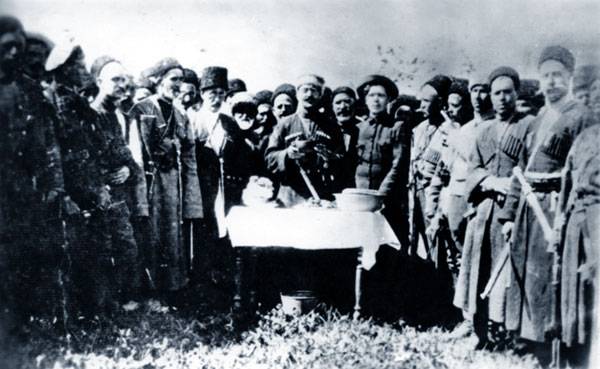
The revolution and civil war of the last century echoed in the Caucasus with a deep schism, which practically turned into a war of all against all. A party of independent Cossacks with the Kuban Rada was formed in the Kuban, Georgian nationalists seized Tiflis in the guise of the Mensheviks, and the Soviet Terek Republic in the RSFSR was proclaimed in Vladikavkaz and Pyatigorsk, which did not prevent the Terek Cossacks from rising, the Gor Republic ruled in modern Dagestan foreman Lazar Bicherakhov, then the North Caucasus Emirate, etc.
They did not lag behind the neighbors of Kabard and Balkaria, where the star of the head captain Zaurbek Aslanbekovich Dautokov-Serebryakov rose. A veteran of World War I, Zaurbek raised an anti-Bolshevik uprising in Kabarda, and subsequently in Balkaria. All this was weighed down by ethnic and religious factors. For example, in 1917, the leader of the anti-Bolshevik forces of Kabarda, Zaurbek, converted to Islam and opposed the Bolsheviks under the green banner of the ghazavat. Dautokov deftly used the religious factor in his war against the Soviets. He even wrote a poem, the slogan of his war:
For dzhigits, it is not new:
A blessing for every brother
Let the holy words of the ghazavat be.
As long as the sacred la-il-laha-il Allah, -
green banner with the moon
Until then there will be no room for fear
In the hearts of all who enter the battle ...
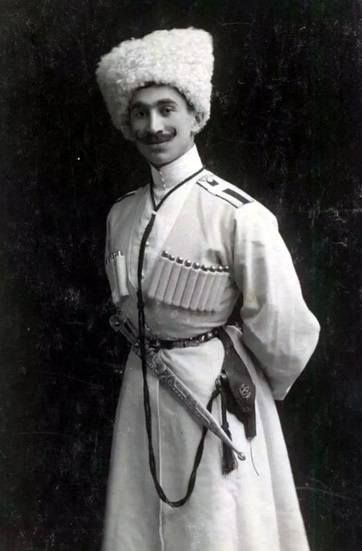
The Bolsheviks were well aware of this game of Zaurbek and his associates, so they decided to seize the initiative in terms of gaining the sympathy of the local population and the establishment of Soviet power in Kabarda and Balkaria. In January 1918, the Council of People's Commissars of the RSFSR adopted a decree "On Freedom of Conscience, Church and Religious Societies." They decided to use this. Despite the fact that the Bolsheviks were opponents of the adat and Sharia that was widespread among the highlanders, which was still used during the tsarist regime, they looked outwardly towards these phenomena in order to gain the support of the Kabardians and Balkars.
On the way to the Sharia column
The support of the Bolsheviks in Kabarda was Nazir Kathanov. An orientalist, an Arabist who taught Arabic at the Nalchik real school, Nazir was not just a significant figure for Kabarda. Even in his youth, he graduated from the madrassah and the Baksan Theological School and knew the Koran no worse than his father's Bible. Kathanov was convinced that the Bolshevik principles and the principles of Sharia are almost identical, which means that they can not only be compatible, but can complement each other. In addition, religious freedom, in his opinion, removed many of the inter-religious problems of the Caucasus.
In August 1918, the Bolshevik party instructed Nazir to begin forming Soviet forces in Kabarda in order to confront Zaurbek Dautokov. It was then that the slogan “For Soviet Power and Sharia” appeared. But the main thing that Kathanov achieved during the formation of the future Sharia column is that he knocked out the ethnic-religious factor from under Dautokov’s feet. The Kabardian peasants recruited by Nazir and other sympathetic comrades seemed to say: this is our internal conflict, an ideological conflict.
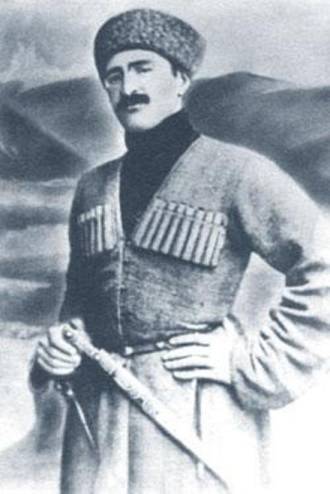
In the early fall of 1918, Kathanov with a small Russian-Kabardian detachment arrived in the area of the village of Lesken, located on the border of modern Kabardino-Balkaria and North Ossetia-Alania. Here he was able to recruit significant forces. A small detachment has grown to 1500 riders. To strengthen Kathanov’s detachment, a group of Ossetian-Kermenists (the Ossetian revolutionary-democratic national party “Kermen”, later joining the Bolshevik party) was sent, led by Soslanbek Tavasiev, a future prominent artist and sculptor of Ossetia. Finally, the combined detachment marched towards Nalchik. As he moved to the city, Kathanov managed to bring the squad to 4000. I had to reckon with this force.
At the same time, the Terek Cossack uprising flashed with might and main. Cossacks occupied Mozdok, a number of large villages and temporarily captured Vladikavkaz, but were driven out of there. These events were closely watched by formal authorities in Kabarda - the Kabardian National (sometimes indicated: popular) Council, headed by Tausultan Shakmanov. The Council took a precarious wait and see attitude, trying to maintain neutrality. Shakmanov also sent delegates to the Terek Cossacks, the Bolsheviks, and to Dautokov’s detachment. The local population was forbidden to join any units. Despite this, the Council unequivocally recognized Kathanov as a provocateur and ordered him to be arrested immediately.
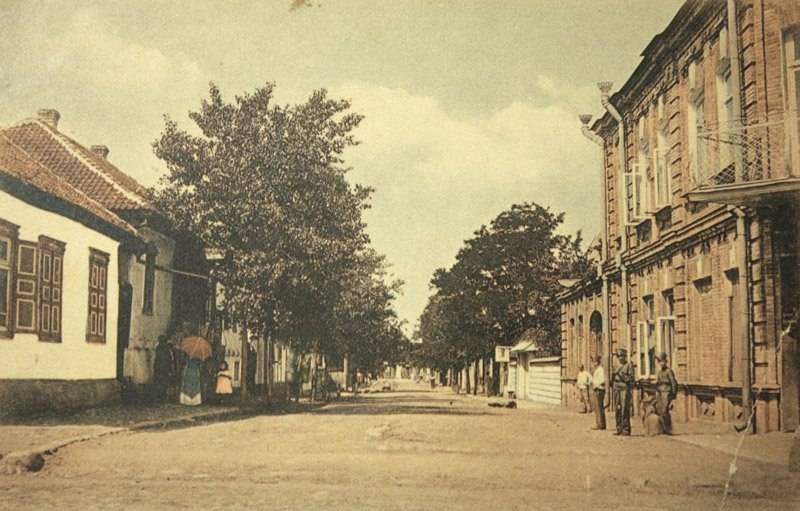
On the 20th of September 1918, a detachment of 25 horsemen came forward to meet Kathanov with the aim of arresting him. The arrest did not go according to plan. 4000 Russians, Kabardins and Ossetians instantly disarmed the detachment sent by Shakmanov. On September 24, Kathanov occupied Nalchik without a fight and came to the Council, saying that the District Council, the Kabardian National Council and the Spiritual Council did not enjoy the confidence of the working people. On this basis, the new Sharia unit requires Shakmanov to resign and transfer power to the Military Sharia Military Council, which was recently formed within the detachment.
Cossack Mironenko and his Sharia red
Simultaneously with the occupation of Nalchik, the structure of the control of the column began to take shape and the creation of a revolutionary military council began. Grigory Ivanovich Mironenko, a participant in the First World War, became the commander of the Sharia column himself (soon it will be called the First Sharia Sharia Column); he was a Kuban Cossack from the village of Razdolnoy. Later, Grigory Ivanovich for skillful leadership of troops and personal courage will be awarded a silver saber from the hands of Sergo Ordzhonikidze and awarded the military award - the Order of the Red Banner. Under Mironenko was Kathanov, who officially commanded all the indigenous troops that periodically entered the convoy. In addition, Kathanov was a representative of the Kabardian people. N.S. was appointed Commissioner of the column Nikiforov. The Revolutionary Military Council was also international: Kathanov (chairman), E. Polunin, M. Temirzhanov, S. Tavasiev and T. Sozaev.
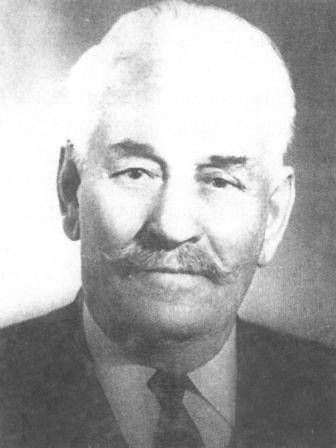
By the time of the capture of Nalchik, more and more large Bolshevik detachments began to adjoin the column. The Sharia column represented a significant force, knocking out the national factor from under the feet of anti-Bolshevik groups. On September 25, a unique, one-of-a-kind governing body appeared in the entire Caucasus - the Military Sharia Revolutionary Council. Instead, the dreamer Kathanov created the Sharia court in each village, consisting of two effendi elected by the population. Village councils and mullahs were elected for six months. The views of Kathanov and the troops touched. From now on, each regiment had its own spiritual leader - the mullah. Despite the fact that in the eyes of the commissars it looked like medieval savagery, Kathanov with his column was necessary, therefore, apparently, it was regarded as temporary relief.
Soon, most of the Sharia Reds were forced to leave Nalchik, since the Terek uprising was expanding, which was partially provoked by the revolutionary groups themselves, which brought their excesses and robbery of the Cossacks to the extreme. Many “red” highlanders distinguished themselves, who began to rob Cossack neighbors, hiding behind the ideas of the Bolsheviks.
True, it is worth pointing out that Kathanov tried to stop this discord, at least in Kabarda, not forgetting the interests of the Bolsheviks. So, the Military Sharia Council issued an appeal in Russian and Arabic:
However, already in early October 1918, leaving a small garrison in Nalchik, the convoy left for Pyatigorsk. There, the column was reorganized into the 1st shock Soviet Sharia column (Derbent Rifle Regiment, 1st Peasant Regiment, Black Sea People's Regiment, Taganrog Infantry Regiment, Nalchik Cavalry Regiment, First Revolutionary Cavalry Kuban Regiment, First Sharia Cavalry Regiment, Terky artillery division, howitzer division, escort squadron, control company). The commander of the new unit was the aforementioned Mironenko.
From the very first days, heavy fighting ensued for Grozny and the village of Prokhladnaya, in the region of Mineralnye Vody, Kislovodsk and Essentuki. The soldiers of the column fought desperately, brutally and swiftly maneuvering, which was highly appreciated by Sergo Ordzhonikidze, who noted the military operations of the column in a telegram to Lenin.
Fights for Nalchik, or Dautokov strikes back
While the main forces of the column fought east and northwest of Nalchik, Dautokov decided to take the city in which there was only a tiny garrison of Sharia red. His Svobodnaya Kabarda squad consisted of three equestrian hundreds, a plastun division, a machine gun team and two guns, and all the Red forces in Nalchik barely reached 700 fighters without artillery support.
At the beginning of October 1918 in Nalchik they already knew about Dautokov’s advance on the city. However, the garrison not only did not retreat and did not run away, but made a truly suicidal decision. Instead of turning the city into their own fortification, the Reds decided to counter-attack the advancing Zaurbek.
On October 6, in the area of the Tambievo aul (now the village of Dygulybgey in the KBR), on the Baksan River (north of Nalchik), a tragic battle broke out between the Nalchik detachment of the Sharia column and the “Free Kabarda” detachment of Dautokov, which lasted almost all day. As expected, despite the desperate courage of the Sharia Reds, they were defeated. The defeat turned out to be very serious. The commissar of the detachment, Mazhid Kudashev, died in the battle, and the Nalchik garrison lost more than half of the soldiers killed. Only at 22:00, in pitch darkness, the Reds began to retreat towards Ossetia. Scattered small groups will later join the ranks of the Ossetian-Kermenists.
Dautokov solemnly entered Nalchik the next day, beginning to redo the edge and its legislative base. Zaurbek, oddly enough, now also opposed ethnic hatred, however, it couldn’t be different, given the plastunas in his detachment, talked about the brotherhood of Kabardins and Russian Cossacks and, of course, immediately asked to form new detachments against the Bolsheviks.
Nalchik is red again, again white and red again
On November 19, the Sharia column, reinforced with the advanced units of the 11th and 12th Red Army, easily occupied Nalchik. Shakmanov, whom Dautokov returned to power, fled. Dautokov himself retreated to join the Denikin Volunteer Army. In Nalchik, Kathanov again returned the "old" order. However, the Bolsheviks now reacted somewhat shorter to his Sharia fantasies, limiting the practice of applying Sharia exclusively between Muslims.
And again the column crushed forces, having left to fight with parts of Bicherakhov. Volunteer troops again took Nalchik. This time, agitation began, in which the Bolsheviks presented themselves as persecutors of Muslims. The formal ruler of Kabarda, Prince and General Fyodor Nikolayevich Bekovich-Cherkassky made a resounding statement:
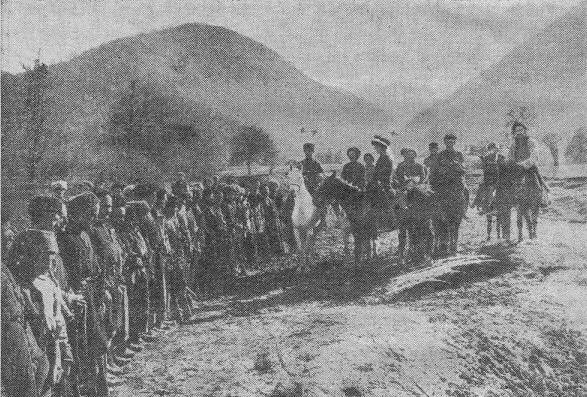
The Soviet Sharia column has lost its significance. As a result, its units led by Kathanov almost joined the army of the North Caucasus Emirate, where they retreated with battles with the Volunteer Army. The emirate, although led by the emir of Uzun-Haji, a political and religious leader who led a religious war against the All-Union Socialist League, soon came under the strong influence of the Bolsheviks. The Minister of the Interior was the Bolshevik Khabala Besleneyev, and the chief of staff of the troops, Magomet Haniev, was also a Bolshevik.
By the beginning of 1920, the unification of Bolshevik forces began in the North Caucasus. In early March 1920, Kathanov was already able to free a significant part of Kabarda from Denikin's forces. On March 10, Nalchik was taken by fighters of the former Sharia column. Almost immediately, the dreamy Nazir introduced the following proposals into the draft constitution of the Mountain Soviet Socialist Republic: to introduce Sharia proceedings in the places of residence of the Muslim population along with the Soviet people's courts, to create Sharia departments at the Commissariat of Justice of the Mountain Republic and at district and rural executive committees. But soon the powers of the Sharia courts were significantly narrowed. In the end, the courts were completely liquidated.
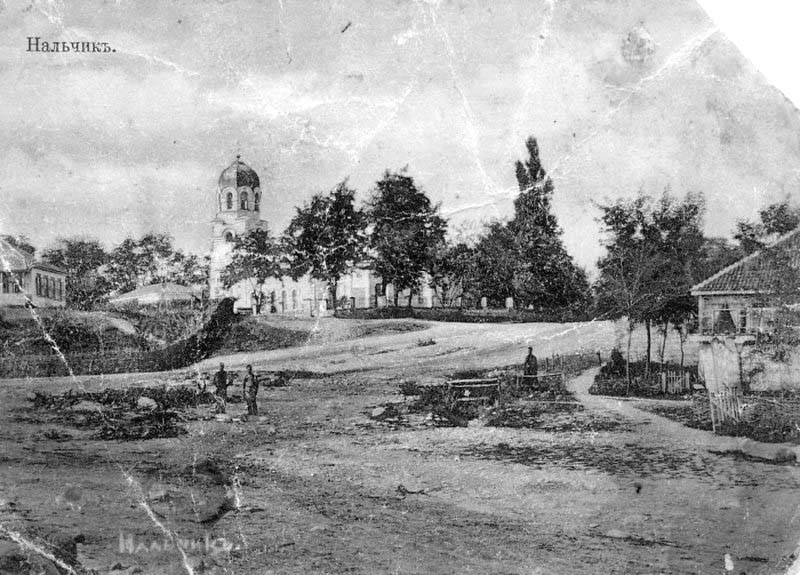
Kathanov continued his political activities, founded the first local history museum in Nalchik, etc. But, prone to excessive reverie and lack of a real outlook on things, he fell into purely political millstones. In 1928, he was arrested and shot for trying to create a nationalist terrorist group. In 1960, he was posthumously rehabilitated.
Commander Mironenko, tired of the endless bloody war, returned to his native village of Razdolnaya. During the Great Patriotic War, almost 60-year-old Grigory Ivanovich carried out the instructions of the party’s regional committee to organize the supply of the Soviet Army, and also took part in the formation of the volunteer division. In 1944, Mironenko was elected chairman of the executive committee of the Zheleznovodsk Council of Workers' Deputies. Grigory Ivanovich Mironenko was awarded the Orders of Lenin and the Badge of Honor. The once formidable commander of the shocking Soviet Sharia convoy died in 1970.
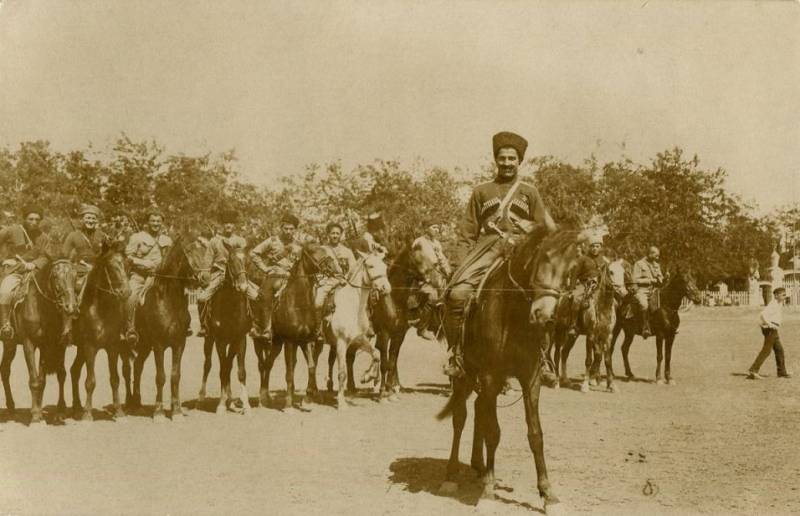
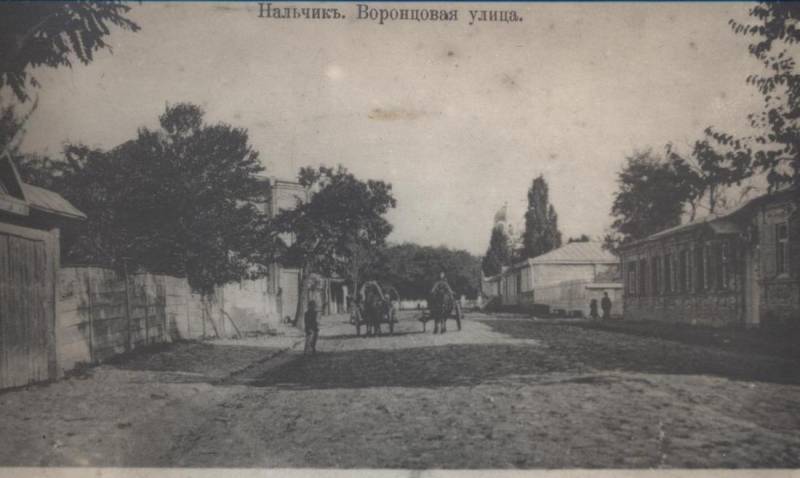
Information